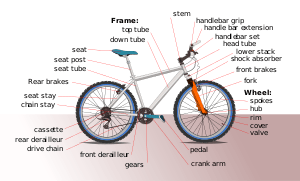bicycle
English

A bicycle
Etymology
From bi- (“two”) + Ancient Greek κύκλος (kúklos, “circle, wheel”), on the pattern of tricycle. First attested in English in 1868, from French bicyclette (1847). Superseded earlier velocipede.
Pronunciation
- IPA(key): /ˈbaɪsɪkl̩/
Audio (US) (file) Audio (UK) (file) Audio (AU) (file) Audio (file) - Rhymes: -aɪsɪkəl
- Hyphenation: bi‧cy‧cle
Noun
bicycle (plural bicycles)
- A vehicle that has two wheels, one behind the other, a steering handle, and a saddle seat or seats and is usually propelled by the action of a rider’s feet upon pedals.
- A traveling block used on a cable in skidding logs.
- The best possible hand in lowball.
- (Britain, Australia, New Zealand) A motorbike.
Synonyms
- bike (colloquial)
- cycle
- push-bike, pushbike
- velocipede
- See also Thesaurus:bicycle
Translations
vehicle
|
|
- The translations below need to be checked and inserted above into the appropriate translation tables, removing any numbers. Numbers do not necessarily match those in definitions. See instructions at Wiktionary:Entry layout#Translations.
Verb
bicycle (third-person singular simple present bicycles, present participle bicycling, simple past and past participle bicycled)
Translations
to ride a bicycle
This article is issued from
Wiktionary.
The text is licensed under Creative
Commons - Attribution - Sharealike.
Additional terms may apply for the media files.